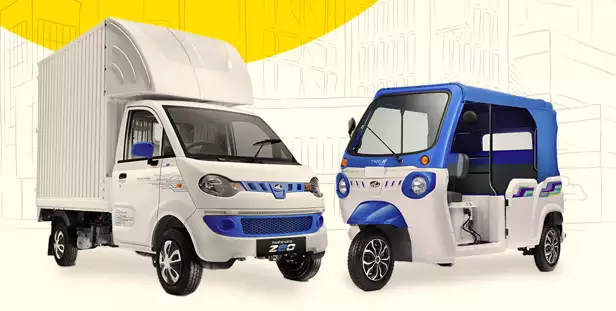 Through this collaboration, Vidyut has expanded its BaaS offering to cover both four-wheeler and three-wheeler vehicles, including both cargo and passenger models.
Through this collaboration, Vidyut has expanded its BaaS offering to cover both four-wheeler and three-wheeler vehicles, including both cargo and passenger models.Mahindra Last Mile Mobility Ltd (MLMML) has partnered with Bengaluru-based electric vehicle (EV) startup Vidyut to launch a Battery-as-a-Service (BaaS) financing program aimed at reducing the cost of electric vehicle ownership. The collaboration, announced on Wednesday, is designed to make Mahindra’s EVs, including the ZEO (4W), Zor Grand, and Treo Plus (3Ws), more affordable for customers by offering a flexible, battery rental option.
Under the new BaaS model, customers can rent the battery of their chosen EV for a minimal fee starting at INR 2.50 per kilometre. This approach allows EV owners to avoid the high initial purchase cost of batteries, thus reducing the upfront vehicle acquisition cost by up to 40% when compared to traditional internal combustion engine (ICE) vehicles. The BaaS programme aims to significantly improve the affordability of electric vehicles, which has often been a barrier for many prospective buyers.
Flexible Options for Battery Rental and Ownership
In addition to the minimal rental fee, Vidyut will offer customers the choice to either continue with the battery rental programme or buy out the battery after the financing term ends. For those who choose to continue with the rental, the option to discontinue the programme is also available. By paying off the remaining value of the battery, customers can exit the programme at any time. This flexibility provides a sense of control for vehicle owners, offering more freedom to tailor their EV ownership experience to their financial preferences.
Suman Mishra, Managing Director & CEO of MLMML, highlighted the significance of the collaboration, saying, “This partnership will undoubtedly contribute to the increased adoption of electric vehicles by enabling customers to purchase last mile EVs with a reduced initial cost.” She emphasised how the BaaS model will ease the transition to electric mobility by lowering the financial barriers typically associated with EV ownership.
Vidyut’s Vision for Sustainable Mobility
Vidyut, a full-stack EV startup founded in 2021, has been working towards making EV ownership more convenient and affordable. The company's Co-Founder, Xitij Kothi, explained the core philosophy behind the BaaS model: “As a company, we view batteries as fuel, while others see them as assets. Our question has always been when the vehicle isn’t on the road, why should you still pay for the battery?” He further elaborated on the partnership, stating, "Our goal is to make sustainable mobility not only affordable but also accessible, enabling more people to embrace EV ownership without the financial burden that often comes with it."
Through this collaboration, Vidyut has expanded its BaaS offering to cover both four-wheeler and three-wheeler vehicles, including both cargo and passenger models. The flexibility of the BaaS plan aims to make electric vehicles more accessible for a wider range of customers, supporting the transition to sustainable mobility across various vehicle types.
The partnership between MLMML and Vidyut represents a significant step in the Indian EV market, where cost remains one of the biggest barriers to widespread adoption. Electric vehicles, although environmentally friendly and cost-effective over time, typically involve higher upfront costs due to expensive batteries. This initiative aims to bridge that gap by offering a more affordable and accessible way to own EVs.
Vidyut has been a leader in the EV startup ecosystem, focusing on innovative financial models to make EV ownership more affordable. Its BaaS model not only reduces the initial cost but also offers a pay-as-you-go structure, giving customers the ability to manage their expenses more effectively.
By integrating this model into Mahindra’s last-mile electric vehicles, the companies are aiming to drive wider EV adoption in the country, with a particular focus on the commercial segment. The flexibility in battery management and rental payments positions the BaaS model as a viable option for small businesses and individuals looking to switch to electric mobility without incurring substantial upfront costs.
